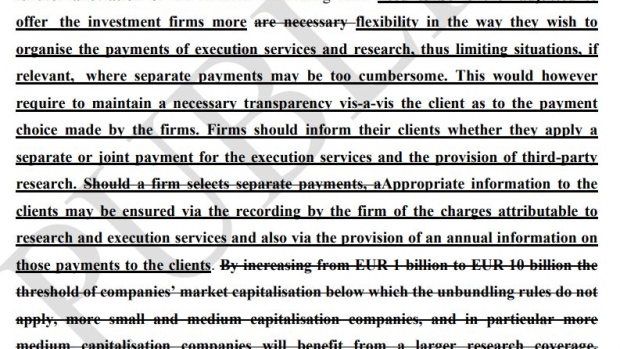Jun 20, 2023
MiFID Revamp Could Reverse Ban on Bundling Research With Trading
, Bloomberg News

(Bloomberg) -- A notorious piece of European Union legislation that forced financial firms to separate the cost of investment research from that of trading could be reversed under plans being championed by the bloc’s member states.
In upcoming negotiations with the European Parliament aimed at revising MiFID II — a set of broader reforms that came into force in 2018 — the states will seek a near total U-turn on the rules behind so-called unbundling.
Their proposals would mean an investment firm would only have to inform clients whether they are paying for research and trading jointly, and record the charges attributable to each.
That’s a dramatic shift from current regulations, which separated the two in a bid to eliminate conflicts of interest that could distract money managers from seeking the cheapest transaction costs for investors. But evidence suggests research provision across the region has suffered as a result.
The EU states’ plan is laid out in their agreed position for talks with the European Parliament, published last week. The final shape of any regulatory changes will be decided in the negotiations, and the exact timetable for a conclusion is not yet clear.
The prospect of a major rollback of the rules comes at a key moment for the research industry globally. In the US, a waiver that has allowed brokers to charge European clients separately for trading and research is about to expire, forcing them to finally adapt to the regulatory mismatch between the regions. Meanwhile, the UK is undertaking a review of investment research that’s expected to lead to its own easing of unbundling rules.
Read more: Wall Street Faces Fresh Fight Over MiFID II With SEC’s Gensler
The EU’s Markets in Financial Instruments Directive, known as MiFID II, upended the world of sell-side research in 2018 when it banned the common Wall Street practice of bundling trading commissions with the cost of analysis.
But putting an explicit price tag on research resulted in reduced stock coverage, raising concern that the rules are hurting Europe’s financial markets — especially its small-caps.
In response, the European Commission — the EU’s executive body — in December suggested a partial easing of the rules surrounding research. But the published stance of the Council of the European Union, which represents member states, goes much further.
“The research unbundling rules need to be further adjusted to offer the investment firms more flexibility” in order to ensure sufficient coverage especially of small- and mid-caps, according to the group’s mandate for negotiations. “This would however require to maintain a necessary transparency vis-a-vis the client.”
‘Harmful Market Disruptions’
The debate comes as the industry braces for fresh MiFID II-related upheaval when a Securities and Exchange Commission “no-action letter” tied to the legislation expires in the US on July 3.
Without that exemption from domestic rules, brokers in the world’s biggest economy have to figure out how to take payment for research from their MiFID-bound clients. Under US law, receiving cash for such services could mean registering as Investment Advisers, bringing a whole new set of compliance obligations.
Last week, the Global Financial Markets Association — which is made up of industry groups in the US, Europe and Asia — urged the SEC to extend the waiver until any eventual changes to MiFID are implemented. That could happen later this year or next if there is political agreement over the coming few months, it said.
“We are writing you to urge you to work together to avoid harmful market disruptions that might arise in connection with any changes to the MiFID II unbundling requirement, including a loss of access to critical research” from US brokers to MiFID-compliant managers, the group wrote in a June 12 letter to the US regulator, the UK Treasury and the European Commission.
The EU in 2021 allowed rebundling of trading and research costs for analysis of stocks worth up to €1 billion ($1.1 billion). But the move had little impact as most firms don’t want to introduce two separate systems for invoicing, the Commission noted in December. At that time it proposed lifting the limit to include research on companies with a market cap of up to €10 billion.
Meanwhile, the UK’s review of the investment industry, which is ending this month, is part of Chancellor of the Exchequer Jeremy Hunt’s plan to boost the financial sector.
“Changing research is not going to be a panacea in and of itself, but in order to support the capital formation process, you need to create economic incentives for people to produce research,” said Neil Scarth, principal at Frost Consulting, which advises money managers on sell-side research. “Governments are now starting to understand this.”
--With assistance from Kevin Whitelaw.
©2023 Bloomberg L.P.






